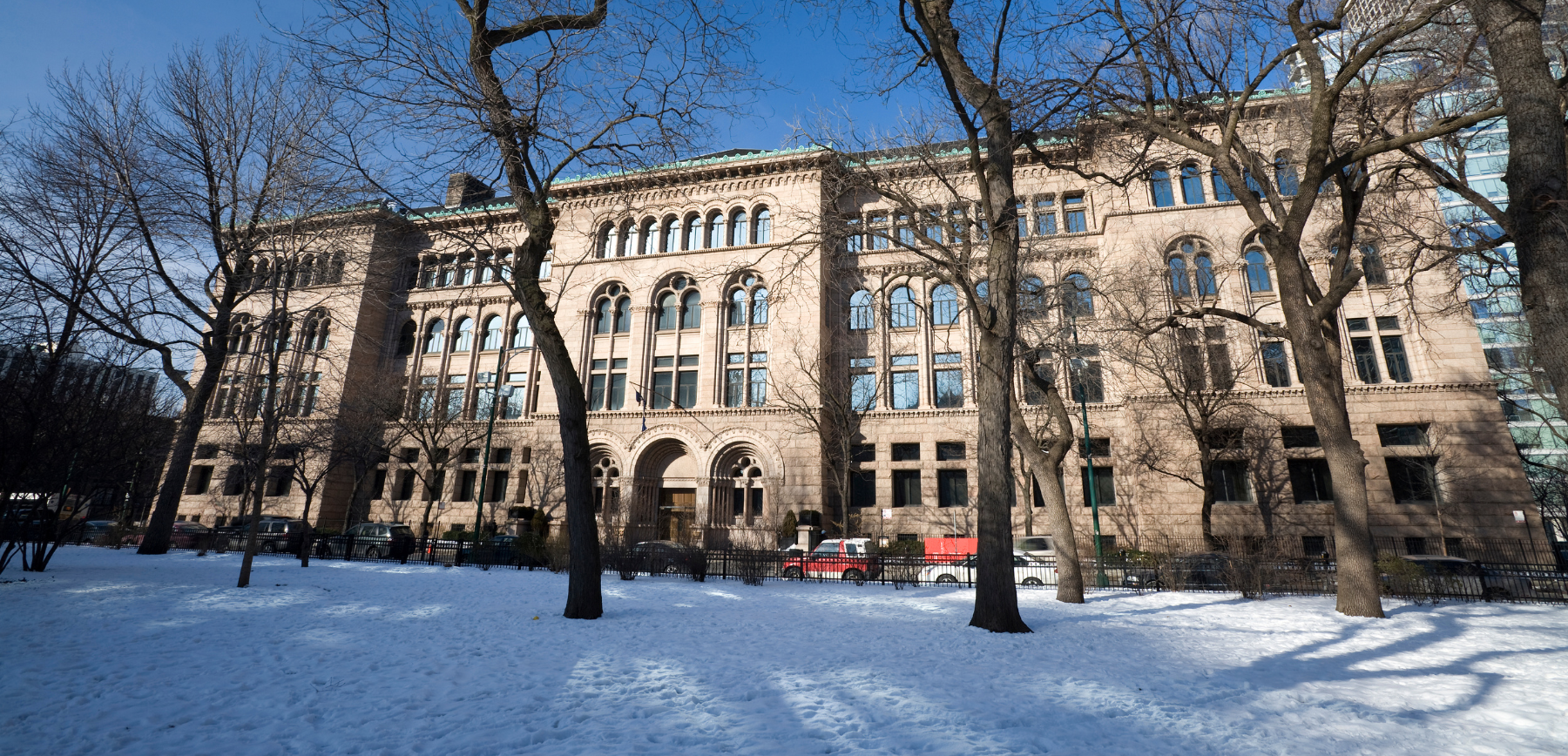
The History of the Newberry Library
Published on September 21, 2023
eATLAS has partnered with the Newberry Library on Revolutionary Ride, a free biking tour of the Humboldt Park and Pilsen neighborhoods that focuses on the political struggles in the Americas through monuments and public art. The tour is available in both English and Spanish.
By Dave Lifton (@daveeatschicago)
Since 1893, the Newberry Library has sat majestically overlooking Washington Square Park on Walton St. on the Near North Side. Today the Newberry is known as one of the most celebrated non-circulating private reference libraries in the U.S., and it remains free for all over the age of 14 to use.
Flash back to Chicago’s earliest days. In 1833, the year Chicago was incorporated as a town, Walter Loomis Newberry arrived from his native Connecticut. The 29-year-old was one of the many who were lured to the swampy shores of Lake Michigan by the unlimited potential for wealth the land promised. In addition to buying real estate, he was the president of the Galena and Chicago Union Railroad—the first railroad built out of the new town—and was also involved in banking. Newberry was an alderman on the City Council from 1851-53, representing what is now Streeterville. Shortly thereafter, he was on the Chicago Board of Education, and served as its president in 1863.
However, tragedy soon struck. On Nov. 6, 1868, Newberry was traveling via steamship to France to join his wife, Julia, and their two daughters when he died of tuberculosis. Rather than have him buried at sea, the ship’s captain had Newberry’s body placed in a cask of rum for preservation until it could be properly returned to Chicago, where he was interred under an obelisk at Graceland Cemetery.
As a footnote, over the years, it was reported that Newberry was buried in the rum barrel, a rumor that the library has denied.
Julia Newberry outlived all six of their children, none of whom produced any offspring. Her death in 1885 split the Newberry estate between nieces and nephews, with the other half—$2.1 million—earmarked to endow a library. Within two years it had opened in a temporary site on LaSalle St., and William F. Poole, the first librarian of the Chicago Public Library, was chosen as the first librarian.

One year later, it moved to a second location, the Newberry homestead on the block bordered by Ontario, Rush, Erie, and Pine (now Michigan Ave.) Streets. The third iteration of the library opened in 1890 at State and Oak Streets, with a collection of more than 60,000 books and nearly 24,000 pamphlets. But the Newberry still needed a facility that could grow along with it.
The new lot chosen for the library had previously been the home of Mahlon Ogden, the brother of William Butler Ogden, Chicago’s first mayor. Ogden’s home had been the only house in the path of the Great Chicago Fire of 1871 that was not harmed. The library’s trustees purchased the land for $175,000 in 1889.
In November 1893, the collection moved into its permanent home. The Spanish-Romanesque building was designed by Henry Ives Cobb, whose other works in the city include the Chicago Athletic Association, Palmer Mansion (demolished in 1950), and Chicago Varnish Company Building (now Harry Caray’s Italian Steakhouse). By the time it opened, the collection had almost doubled to 117,000 volumes and 40,000 pamphlets, and enough room for up to 4 million books. These days, the Newberry Library has more than 1.5 million books across 27.5 miles of shelves. As it has been since its inception, the library’s focus is on the humanities, with core subjects of American history (in particular the histories of Chicago, the Midwest, and Indigenous people), genealogy, European history dating back to the Middle Ages, maps, postcards, the performing arts, and religion. More than 10,000 items in its collection have been digitized and placed online for members from outside Chicago to access. It also offers classes, public events, and seminars.

The Adventure starts when you say it does.
All eATLAS Adventures are designed and built by experienced eATLAS Whoa!Guides. They're always on. Always entertaining. And always ready to go.
Check out our Adventures!